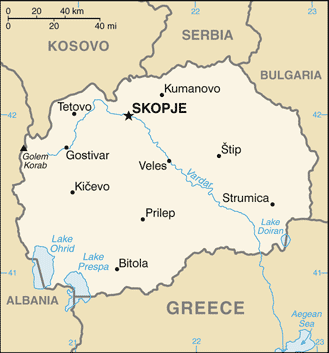Macedonia reports tularemia cases: Skopje officials
Just a month after Kosovo health officials declared a tularemia outbreak, neighboring country, Macedonia has started reporting cases of the bacterial infection in several areas, according to a Focus Information Agency report.

Macedonia/CIA
Health authorities in Skopje have officially registered nine cases of tularemia and say there are another five suspect cases.
Also known as rabbit fever and deer fly fever,tularemia is caused by the bacterium Francisella tularensis. This bacterium is found in nature in rabbits, rodents, beavers, squirrels and several domestic and farm animals.
People commonly get infected from the bites of infected ticks (wood, dog) and deer flies. Hunters are at risk of infection following skinning, dressing and eating infected animals.
Drinking contaminated water has been implicated in tularemia infection. People also contract it through inhaling dust and hay that have rodent feces and carcasses.
There have been cases where people got infected from a domestic cat. It is believed that cats get the organism from contaminated prey and their mouth and claws become infected.
Certain animal associated occupations are also associated with the disease; farmers, veterinarians, sheepherders and shearers.
The disease in people depends on how it is acquired. After infection, incubation can be a couple of days to weeks, with non-specific symptoms like fever, chills, headache, sore throat and diarrhea.
The way the organism enters the body frequently dictates the disease and degree of systemic involvement. The six syndromes are ulceroglandular, glandular, oculoglandular, oropharyngeal, typhoidal and the one with the highest mortality rate, pneumonic tularemia.
For more infectious disease news and information, visit and "like" the Infectious Disease News Facebook page